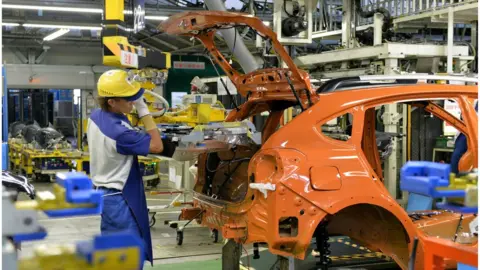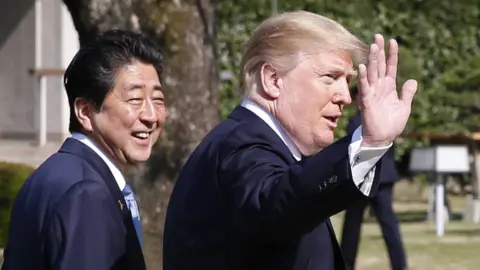Trump lashes out at 'unfair' Japan trade ties
 AFP
AFPUS President Donald Trump has lashed out at Japan over trade and said he would push for a fairer economic relationship between the two countries.
Speaking to business leaders in Tokyo on Monday he said Japan "has been winning" on trade in recent decades.
He also called on Japan to build more cars in America.
Mr Trump's comments come at the start of a 12-day Asian tour which is expected to be dominated by North Korea and trade.
The US leader said his country had "suffered massive trade deficits at the hands of Japan for many, many years".
"We want free and reciprocal trade but right now our trade with Japan is not free and it's not reciprocal and I know it will be and we've started the process," Mr Trump told the group of US and Japanese executives.
He praised Japan, which counts the US as its second largest trade partner after China, for buying American military hardware.
Mr Trump also said he wanted his country to be the most attractive place to hire and invest.
Trade ties
Japan had a $69bn (£52.8bn) trade surplus with the US in 2016, according to the US Treasury department.
The US has a much bigger imbalance with China, which Mr Trump has long rallied against. The total trade relationship between the pair was worth $648bn last year, but trade was heavily skewed in China's favour with the US amassing a nearly $310bn deficit.
Mr Trump's "America First" views are underpinning re-examination of trade with Asia, prompting a crackdown on China's intellectual property practices and fresh negotiations after the US walked away from a major regional trade pact, the Trans Pacific Trade partnership. (TPP).
The remaining 11 nations taking part in the TPP, which includes Japan, are proceeding with negotiations on the agreement without the US.
 AFP
AFPThe US and Japan are now working on a new roadmap for trade, but talks could put a strain on otherwise warm relations between the two countries.
Japan's Prime Minister, Shinzo Abe, was the first foreign leader to meet Mr Trump following his election in November 2016. The pair played golf in Japan on Sunday after which the US president described his relationship with his Japanese counterpart as "really extraordinary".
Made in America
Despite that, Mr Trump took aim at Japanese carmakers in Tokyo on Monday.
"Try building your cars in the United States instead of shipping them over. That's not too much to ask," the US president said at the briefing, adding, "is that rude to ask"?
Data from the Japan Automobile Manufacturers Association, a non-profit trade group, shows that in 2016, three-quarters of Japanese branded cars sold in the US were manufactured in North America.
Last year, those carmakers built nearly 4 million vehicles and 4.7 million engines in the US it said.
They contributed $45.6bn in total investment through 24 manufacturing plants, and 43 research and development and design centres in the US.

Analysis: Karishma Vaswani, Asia business correspondent
Why is President Trump complaining about Japanese cars?
It's true, as he points out, that there is a massive trade deficit between the US and Japan. Last count it was about second only to China's deficit with the US - although that's much bigger.
It's also true that while a lot of Japanese cars ARE made in the US, Americans are still buying cars from Japan, along with agricultural goods, electronic components and pharmaceutical products.
This doesn't wholly explain the trade gap though. The weakness of the Japanese currency, the yen, does. The weaker the yen against the US dollar, the cheaper Japanese goods are for American shoppers.
But this is an old argument, which Tokyo has heard before. Prime Minister Shinzo Abe will be wary of any push from President Trump that will see the yen's value strengthen.

